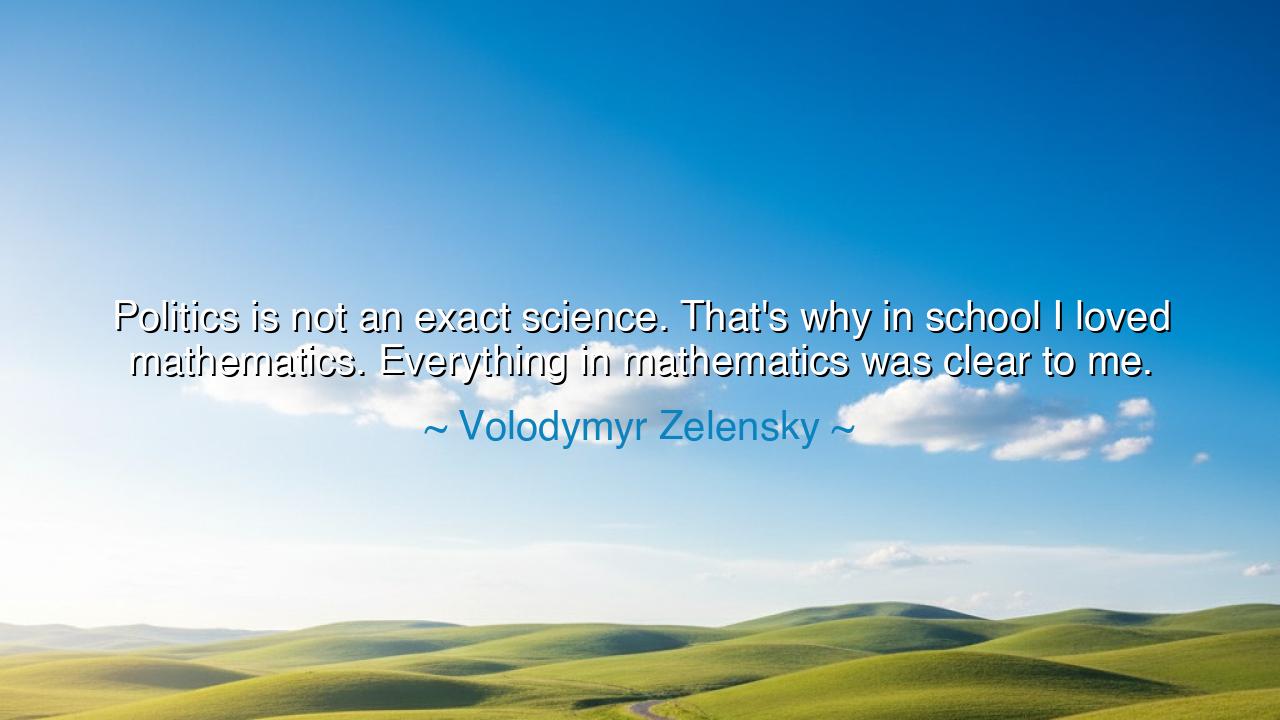
Politics is not an exact science. That's why in school I loved
Politics is not an exact science. That's why in school I loved mathematics. Everything in mathematics was clear to me.






Hear, O children of the future, for the words of Volodymyr Zelensky carry within them a truth that strikes at the heart of both politics and knowledge. "Politics is not an exact science. That's why in school I loved mathematics. Everything in mathematics was clear to me." These words speak of a deep and resonant understanding, a recognition of the difference between the uncertainty of human affairs and the clarity that comes from the precise world of mathematics. Zelensky reflects on the way the world of politics is shaped by the unpredictable forces of human nature, while mathematics, in its beauty and simplicity, offers an order that is at once universal and unchanging. In a world filled with ambiguity, mathematics remains a steady anchor, a realm where every answer is reached through logic, reason, and certainty.
Consider, O children, the ancient world, where the first mathematicians began to unlock the secrets of the universe. Pythagoras, whose name echoes through the halls of history, saw the world as a reflection of numbers and proportions. He believed that mathematics was the key to understanding the harmony of the cosmos, where every element of existence could be expressed through the elegance of mathematical equations. To him, the world was a perfect structure, governed by the same principles that governed the lengths of strings on a harp, the spacing of stars in the sky, and the very essence of life itself. This pursuit of certainty, of clear truth, was at the heart of all knowledge. In contrast, the world of politics—like the shifting tides of the ocean—remains ever-changing, unpredictable, and shaped by the complexities of human will and emotion.
The great Isaac Newton, too, showed us the power of mathematics to explain the laws of the physical world. With his laws of motion and the law of universal gravitation, he provided a framework through which we could understand the movement of celestial bodies and earthly forces. In the world of science, like in mathematics, Newton found a place where truth was not debated, but discovered, a place where the universe was governed by rules that could be understood and articulated clearly. But when it comes to politics, as Zelensky notes, there is no such clarity. Politics, like the waves of the sea, is influenced by the winds of human desire—the desires for power, for control, for justice—which are in constant flux.
Zelensky's words are a reminder of the nature of politics, which is often a realm governed by the unpredictable flow of human emotion and ambition. Unlike mathematics, which gives us precise answers to the most complicated problems, politics requires navigating the murky waters of human interests, conflict, and compromise. Leaders, from the ancient philosophers like Socrates, who sought the truth of human society, to Winston Churchill, who shaped the destiny of a nation in the fires of war, knew that the decisions of government were fraught with uncertainty. The truths of politics are never as clear as the truths of math, where every variable can be known and solved.
Think of the tale of Abraham Lincoln, who, like Zelensky, was faced with the stormy seas of politics. When Lincoln led the United States through the Civil War, he did so not with the precision of a mathematician but with the clarity of purpose that comes from understanding the fundamental nature of human rights and justice. His decisions, fraught with moral and political complexities, were guided by the principles of equality and freedom, but he could not solve the problem of a divided nation with the neat equations of mathematics. Politics, for Lincoln, was not a world of certainty, but one of doubt and conflict—a world where the heart of a leader was as important as the intellect.
Zelensky’s statement also touches on a deeper lesson: that the clarity we seek in life may not always be found in the world of human affairs. When he turned to mathematics in his youth, he found solace in a world where logic reigned supreme and solutions were clear. But the world of politics, as he now understands, does not lend itself to easy answers. And yet, it is in this uncertainty that the power of leadership is found. Just as mathematics reveals the order of the cosmos, so too does politics require the courage to lead in the face of chaos. A leader must seek the truth, even when it is not clear, even when it cannot be neatly calculated. The art of leadership lies in understanding that truth is often obscured by the complexities of human nature, but must still be pursued with the heart and mind of a seeker.
Thus, O children, the lesson of Zelensky’s words is one of humility and understanding. Seek the clarity of mathematics, and allow it to guide your mind in all things. But also, understand that in the world of politics, of human society, the answers are rarely so simple. Politics is a realm where the mind must be as flexible as the heart, where reason must dance with emotion, and where decisions must be made not with certainty, but with conviction and wisdom. So, let both the clarity of science and the complexity of humanity guide your way, and remember that true leadership lies in navigating the stormy seas of politics with both a clear mind and a steady heart.






AAdministratorAdministrator
Welcome, honored guests. Please leave a comment, we will respond soon